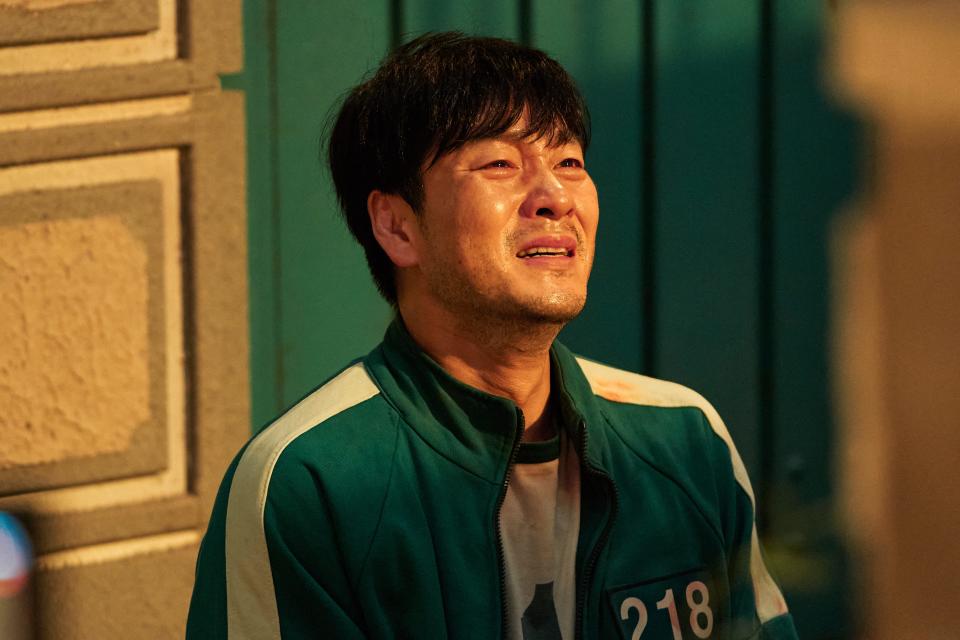'Squid Game': Why everyone is obsessed with Netflix's brutal South Korean horror series
The biggest show on Netflix might just be a South Korean horror series with a cephalopod name and a violent, disturbing concept.
By now you've probably heard of "Squid Game," a dark social satire in which desperately impoverished people are enticed to compete in children's games with deadly stakes for the chance to win a life-changing cash prize. Since its Sept. 17 debut on the streaming service, it has become an online craze, sparking memes and fan theories and becoming the No. 1 show on the streamer in 70 countries, including the U.S., according to Netflix.
We may never have appointment television viewing like "Game of Thrones" again in the streaming era, but amid the proliferation of content, streaming or otherwise, a genuine word-of-mouth surprise can still surface. And that's what's happened with "Squid Game," which received virtually no press or marketing in the U.S. before its debut. It joins a recent list of successful foreign language series for Netflix stateside (including "Lupin" and "Money Heist") and will likely stay at the top of the pop-culture conversation as long as people keep telling their friends to watch.

So what it is about "Squid" (★★★? out of four), that has so many people suctioned to their screens?
There is a visceral, primal, can't-look-away feeling to the nine-episode series, which traffics in gore but also deep psychological horror and disturbances. The protagonist is Gi-hun (Lee Jung-jae), a divorced father who's a bit of a degenerate and a gambler. He's scraping by on the back of his elderly mother, whom he lives with while occasionally stealing her money.
More: 'Money Heist,' 'Lupin,' 'Unorthodox': How Netflix's non-English shows became global hits
After a brutally bad day, Gi-hun is approached by a smartly dressed young man in the subway, who offers him a chance to win money by playing games. After accepting, Gi-hun is whisked (or rather, gassed and kidnapped) to a deserted island, where he awakes in a dormitory with 455 other players. Among them is his childhood friend Sang-woo (Park Hae-soo), the bright kid who got out of the neighborhood, only to steal and embezzle, leaving him wanted and in debt.
The players sign a vague contract to participate in the games and get started with Red Light Green Light – but if they move when they're not supposed to, they are killed by sniper rifle. That's when the stakes of the game become truly real: If you lose any of the games or refuse to play, you die. The players are given an opportunity to leave, but the 45.6 billion won prize (equivalent to nearly $39 million) and the horrors of their own lives bring many back. Soon the players fear not only dying at the hands of the game masters, but by each other, as the worst parts of human nature come out.
"Squid" is immediately evocative of similar films, shows and books including the 2000 Japanese film "Battle Royale" – about kids forced to fight to the death by a totalitarian government – and "The Hunger Games" series. What separates "Squid" is that the players in the game have a false sense of agency in their plight: As the game masters repeatedly say, they all chose to be there. But when their only other option is returning to a life of suffering that's worse, how is that really a choice?

"Squid" harshly critiques society's economic inequalities, especially as the rich controllers and spectators behind the game are revealed. It takes specific aim at South Korea – a North Korean defector is a main character, who ruefully says she escaped the North for a better life in the South, only to find similar desperation – but it's universal in 2021, especially as the coronavirus pandemic has laid bare so many injustices.
More: 50 best TV shows to watch on Netflix right now: 'Seinfeld,' 'You' Season 3 arrive in October
Superb acting performances heighten the drama, particularly from Lee, who makes Gi-hun irresistibly likable despite his many flaws. All of the characters undergo enormous trauma and transformation, and the actors rise to the challenge of portraying believable emotions in an unbelievable setting.
A big part of the series' success lies in its dramatic and eye-catching aesthetic. Director Hwang Dong-hyuk paints the surreal, colorful world of the deadly games like the backdrop of a video game, all exaggerated shapes and sizes and harsh edges that evoke pixels. Juxtaposed against the gray, gloomy streets of Seoul, where many of the characters reside, there's a feeling that the players have crossed over into Oz when they enter the game.

What makes it so well-suited for binge-watching is how well Hwang uses pacing and cliffhangers to make the series absurdly addictive. More than almost any original Netflix series, the endings of each episode seduce you into clicking "next episode." Each is nearly a full hour, but they never feel bloated or boring, like many streaming series do these days. The series is certainly disturbing, although its violence and gore never reaches the bloody levels of "The Walking Dead," instead relying on an insidious psychological horror that wraps its tentacles around you.
Trying to predict the next streaming sensation can be a fool's errand in the current era of television, but there is real delight in finding something without A-list stars, huge marketing budgets or the typical trappings of "prestige" TV that connects with so many people. "Squid" may be so popular because we're in a distinctly bleak moment in history, but connection over something disquieting is better than no connection at all.
And don't worry, no actual squids were harmed during filming.
This article originally appeared on USA TODAY: 'Squid Game' review: Why people are obsessed with Korean horror show